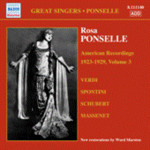
American Recordings, Vol. 3 (1923-1929)
 $25.00
Out of Stock
$25.00
Out of Stock6+ weeks add to cart
VARIOUS COMPOSERS
American Recordings, Vol. 3 (1923-1929)
Rosa Ponselle (soprano) / Various orchestras and conductors
[ Naxos Historical Great Singers / CD ]
Release Date: Friday 31 August 2007
This item is currently out of stock. It may take 6 or more weeks to obtain from when you place your order as this is a specialist product.
Described by Maria Callas as 'the greatest singer of us all', the American-born Rosa Ponselle (1897-1981) is acknowledged as one of the outstanding dramatic sopranos of the twentieth century.
By 1926 the electrical recording process was firmly established as the industry standard. Its expanded frequency and dynamic range produced a more realistic sound, and allowed for subtle nuances in interpretation. Furthermore, the use of microphones allowed artists greater flexibility in performing. In the case of Rosa Ponselle, Aida Favia-Artsay noted that 'on the electric Victors her voice and dramatic perception are at their highest peak'.
In the Met's 1925-26 season Rosa Ponselle made her first appearance as Sélika in Meyerbeer's L'Africana with a cast which featured Gigli, De Luca and Rothier, conducted by Tullio Serafin. Among the comments she wrote about each rôle in my collection of Met programmes, Ponselle noted that L'Africana was 'a great box office attraction; good theatre … but not one of my favorites'. La Vestale which she sang on 12 November was another matter. Her comment written on the programme of the first Met performance was: 'A classic - loved it'. The audience and critics were also in agreement. Lawrence Gilman of the Herald Tribune wrote: 'Here was the youngest vestal who was obviously young. Here was a singer who could sing Spontini's long, gravely sculptured melodies with the required sense of line and dignity of style.' Half a year later Ponselle made her classic recordings of the two Vestale arias. (In 1933, at the first Maggio Musicale in Florence, she performed the rôle of Giulia in her only appearances in Italy.) Many years later Ponselle commented in an interview that 'Gatti wanted me to sing Norma, but I wasn't ready, so they gave me Vestale. I didn't know they were using it as a forerunner for Norma. I don't see any resemblance other than the classic line … but the range was much more comfortable.'
Ponselle went on tour with the Met, and closed the season on 5 May 1926 in Cleveland singing Aida, with Giovanni Martinelli as her Radames. Less than two weeks later the two singers met again in Camden where they recorded the complete 'Tomb Scene'. Their abridged 1924 acoustic recording, available on Naxos 8.111138, omitted the rôle of Amneris and the chorus. Ponselle regarded Aida as 'the greatest opera ever written', and recorded Aida's two solo arias, ' Ritorna vincitor' and ' O patria mia', that same week.
Ponselle and Lauri-Volpi (with De Luca, Matzenauer and Pinza) opened the following Met season with a gala performance of La Vestale on 1 November 1926. On 29 December she gave her first performance as Fiora in Montemezzi's L'Amore dei Tre Re. Three days later, on New Year's Day, Ponselle made her broadcast début on the Victor Talking Machine Hour.
This record also contains a number of songs that often appeared on Ponselle's recital programmes. Two of them were Caruso favourites – 'A vucchella and Luna d'Estate. Most agree that Ponselle's versions are quite worthy to stand alongside those of her mentor. A curiosity is the Ständchen, recorded as a duet with her sister Carmela. A collector in Cincinnati found two unpublished takes of this selection, both of which were damaged. The track here is a composite of the two. Interestingly enough, both sisters firmly denied having recorded together for Victor.
Tracks:
Aida, Act IV (excerpts)
La Vestale, Act II (excerpts)
'A vucchella, "Arietta di Posillipo"
Luna d'estate
Elegie
Ave Maria
Schwanengesang, D. 957: No. 4. Standchen (Serenade)
Aida (excerpts)
4 Songs, Op. 2: No. 2. The Nightingale and the Rose (Vostochniy romans: Plenivshis' rozoy, solovey)
Serenade
Goodbye
Ave Maria
Ernani, Act I: Ernani! Ernani, involami

